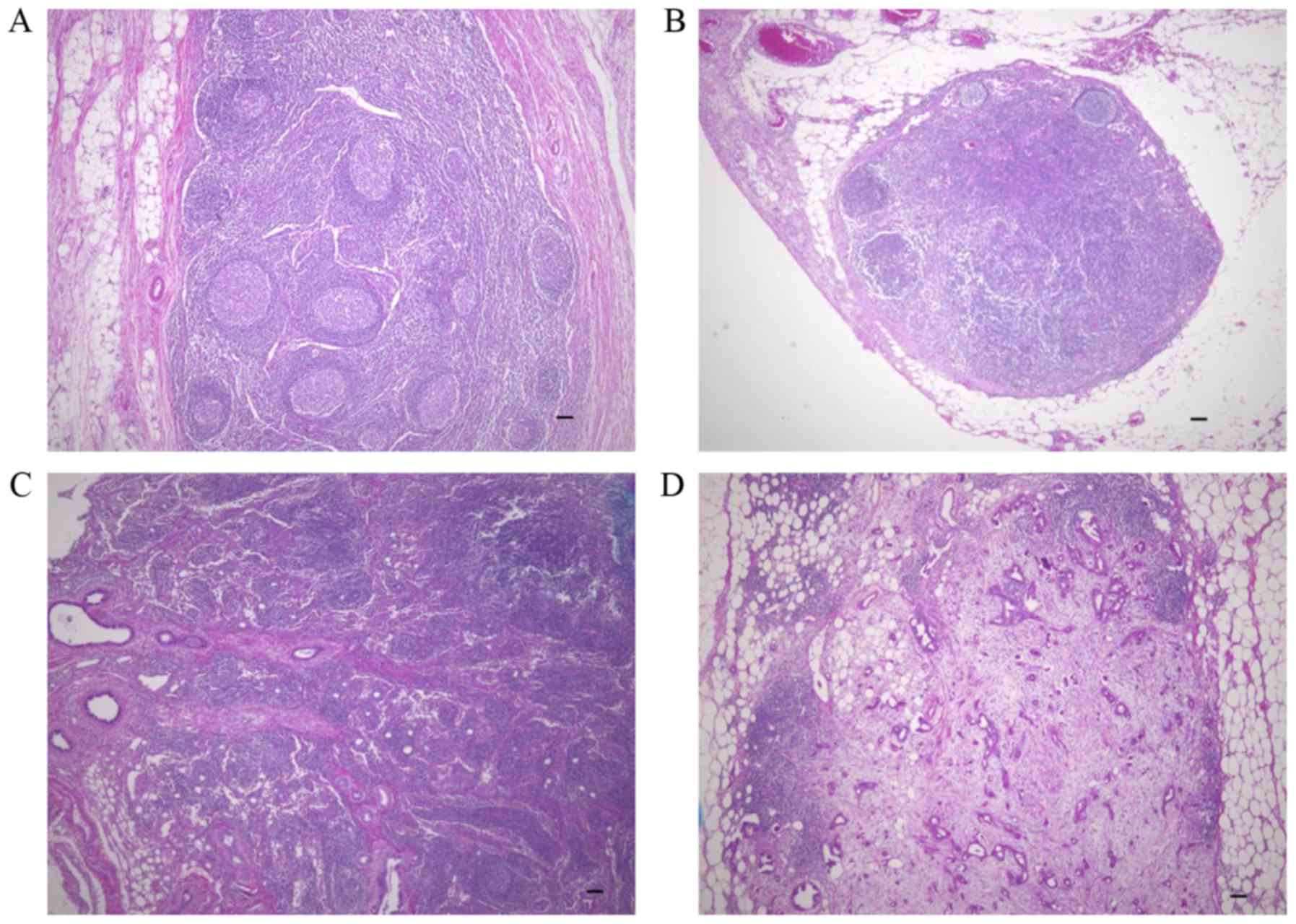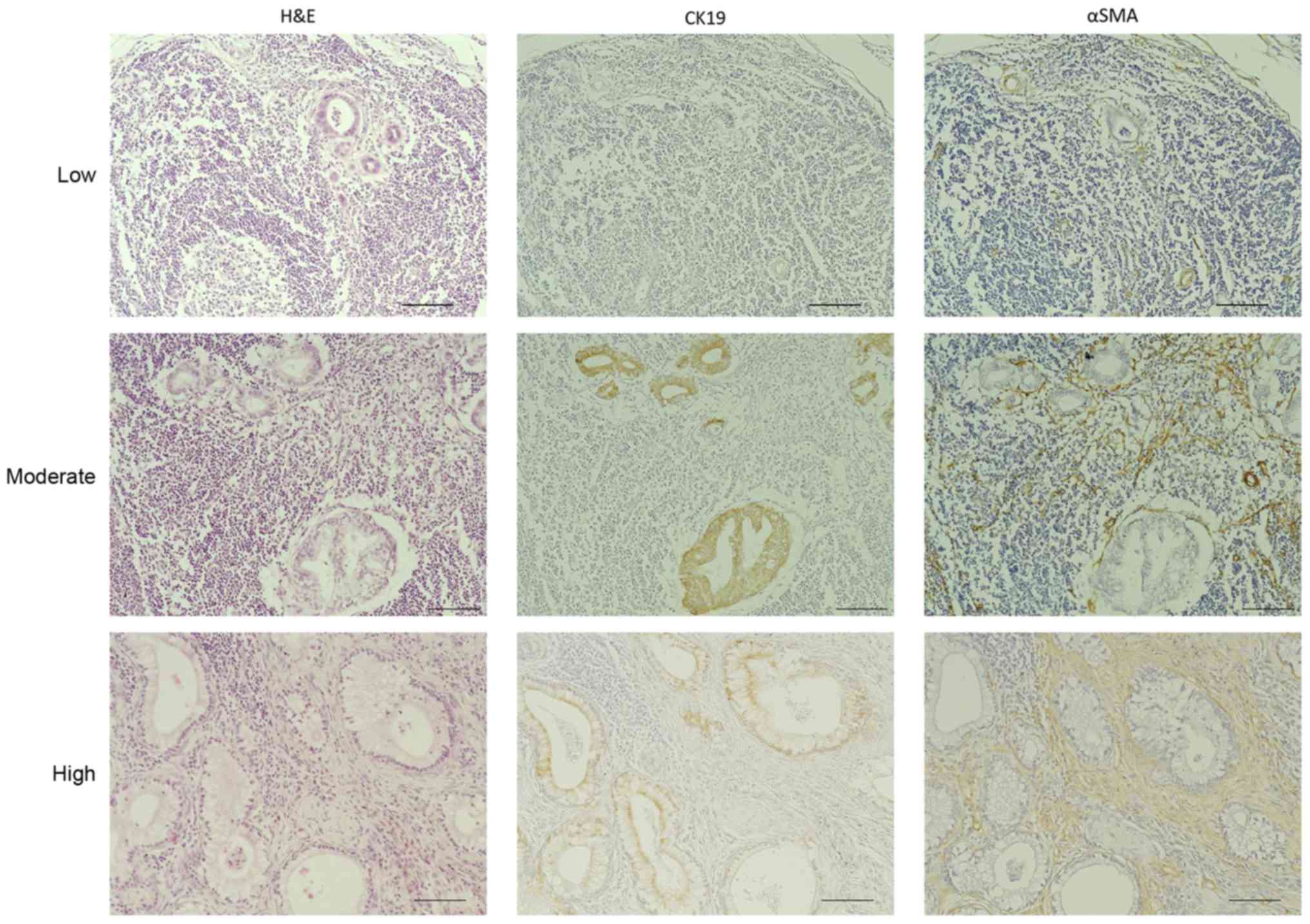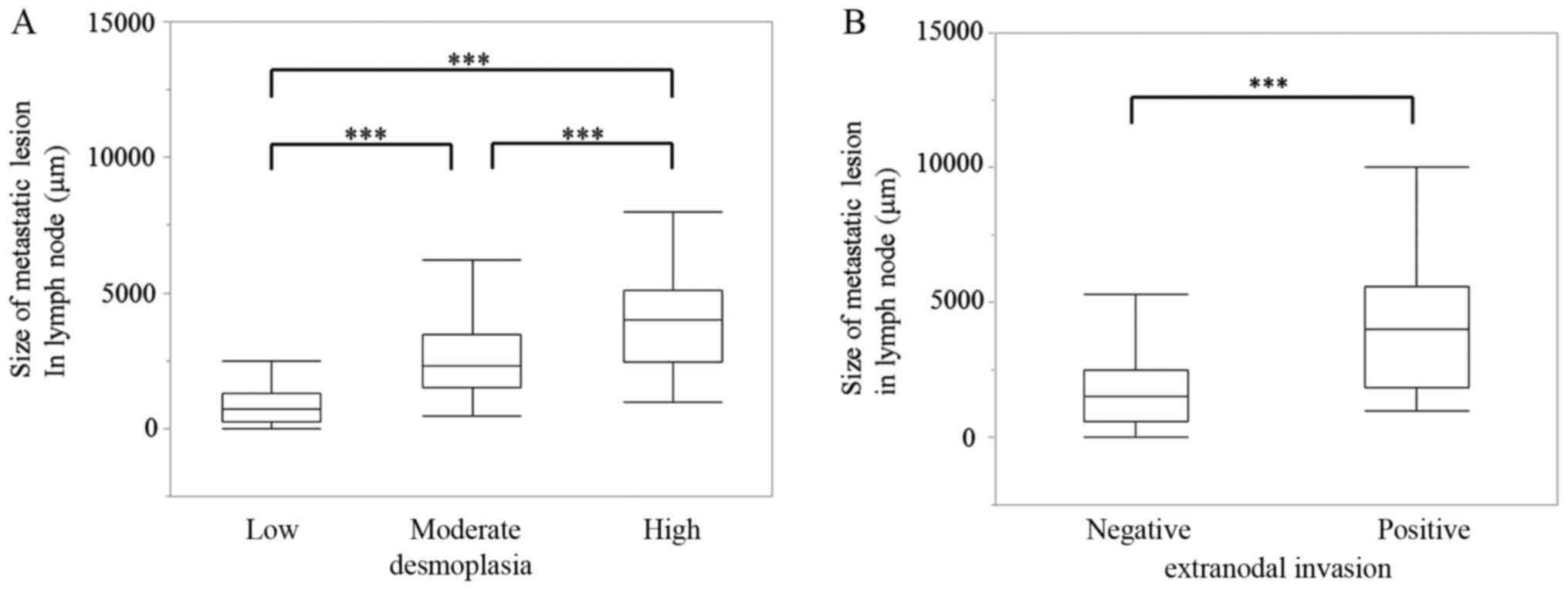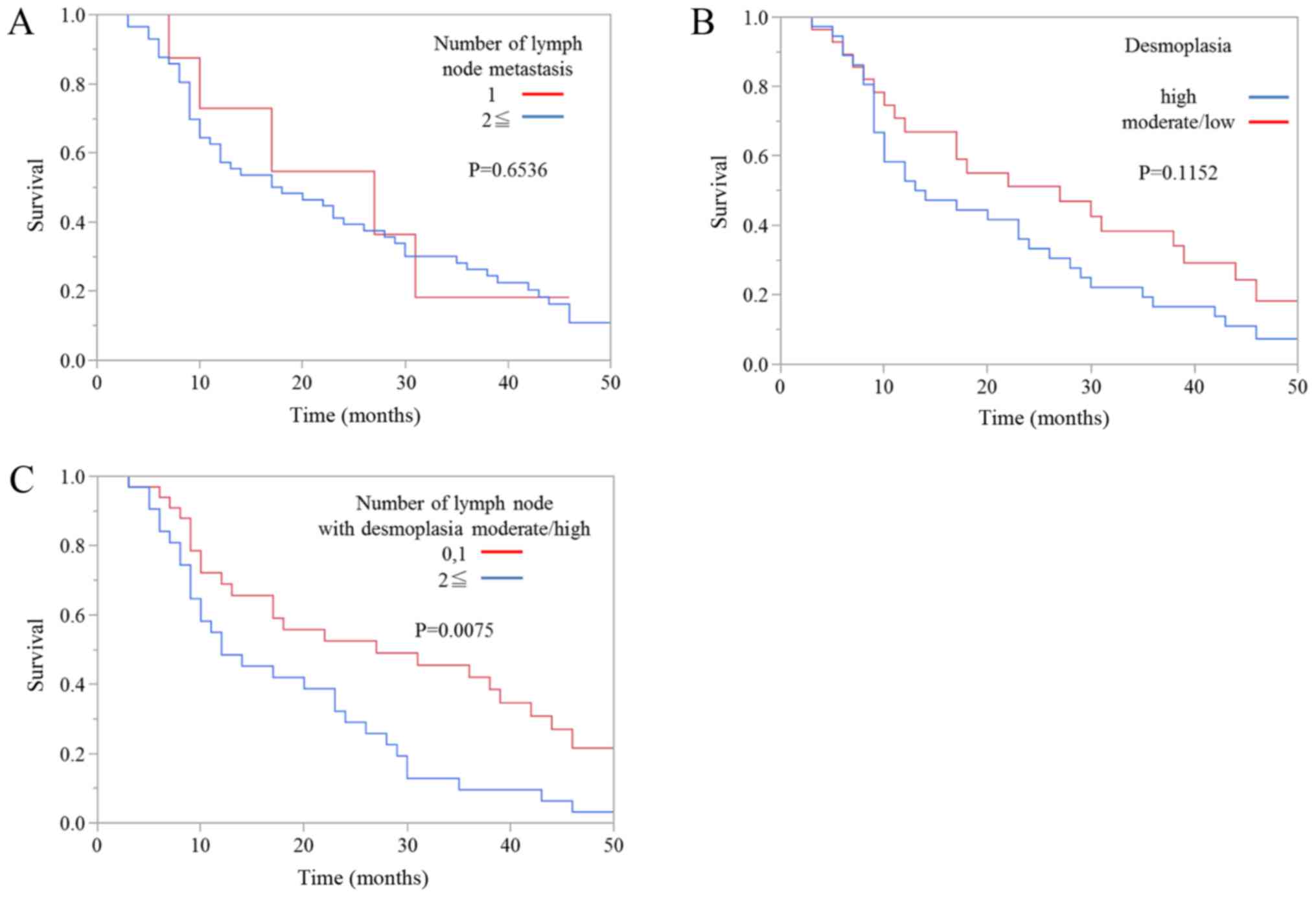|
1
|
Siegel RL, Miller KD and Jemal A: Cancer
statistics, 2016. CA Cancer J Clin. 66:7–30. 2016. View Article : Google Scholar : PubMed/NCBI
|
|
2
|
Vincent A, Herman J, Schulick R, Hruban RH
and Goggins M: Pancreatic cancer. Lancet. 378:607–620. 2011.
View Article : Google Scholar : PubMed/NCBI
|
|
3
|
Malvezzi M, Carioli G, Bertuccio P, Rosso
T, Boffetta P, Levi F, La Vecchia C and Negri E: European cancer
mortality predictions for the year 2016 with focus on leukaemias.
Ann Oncol. 27:725–731. 2016. View Article : Google Scholar : PubMed/NCBI
|
|
4
|
Basturk O, Saka B, Balci S, Postlewait LM,
Knight J, Goodman M, Kooby D, Sarmiento JM, El-Rayes B, Choi H, et
al: Substaging of lymph node status in resected pancreatic ductal
adenocarcinoma has strong prognostic correlations: Proposal for a
revised N classification for TNM staging. Ann Surg Oncol. 22:(Suppl
3). 1187–1195. 2015. View Article : Google Scholar
|
|
5
|
Mahadevan D and Von Hoff DD: Tumor-stroma
interactions in pancreatic ductal adenocarcinoma. Mol Cancer Ther.
6:1186–1197. 2007. View Article : Google Scholar : PubMed/NCBI
|
|
6
|
Nielsen MF, Mortensen MB and Detlefsen S:
Key players in pancreatic cancer-stroma interaction:
Cancer-associated fibroblasts, endothelial and inflammatory cells.
World J Gastroenterol. 22:2678–2700. 2016. View Article : Google Scholar : PubMed/NCBI
|
|
7
|
Fujita H, Ohuchida K, Mizumoto K, Nakata
K, Yu J, Kayashima T, Cui L, Manabe T, Ohtsuka T and Tanaka M:
Alpha-smooth muscle actin expressing stroma promotes an aggressive
tumor biology in pancreatic ductal adenocarcinoma. Pancreas.
39:1254–1262. 2010. View Article : Google Scholar
|
|
8
|
Sinn M, Denkert C, Striefler JK, Pelzer U,
Stieler JM, Bahra M, Lohneis P, Dörken B, Oettle H, Riess H and
Sinn BV: α-Smooth muscle actin expression and desmoplastic stromal
reaction in pancreatic cancer: Results from the CONKO-001 study. Br
J Cancer. 111:1917–1923. 2014. View Article : Google Scholar : PubMed/NCBI
|
|
9
|
Wang LM, Silva MA, D'Costa Z, Bockelmann
R, Soonawalla Z, Liu S, O'Neill E, Mukherjee S, McKenna WG, Muschel
R and Fokas E: The prognostic role of desmoplastic stroma in
pancreatic ductal adenocarcinoma. Oncotarget. 7:4183–4194. 2016.
View Article : Google Scholar : PubMed/NCBI
|
|
10
|
Whatcott CJ, Diep CH, Jiang P, Watanabe A,
LoBello J, Sima C, Hostetter G, Shepard HM, Von Hoff DD and Han H:
Desmoplasia in primary tumors and metastatic lesions of pancreatic
cancer. Clin Cancer Res. 21:3561–3568. 2015. View Article : Google Scholar : PubMed/NCBI
|
|
11
|
Cho SY, Lee TH, Ku YH, Kim HI, Lee GH and
Kim MJ: Central lymph node metastasis in papillary thyroid
microcarcinoma can be stratified according to the number, the size
of metastatic foci, and the presence of desmoplasia. Surgery.
157:111–118. 2015. View Article : Google Scholar : PubMed/NCBI
|
|
12
|
Japan Pancreas Society, . Classification
of Pancreatic Carcinoma. 2nd English. Kanehara & Co.; Tokyo,
Japan: 2003
|
|
13
|
Japan Pancreas Society, . Classification
of Pancreatic Carcinoma. 1st English. Kanehara & Co.; Tokyo,
Japan: 2009
|
|
14
|
Edge SB and Compton CC: The American Joint
Committee on Cancer: The 7th edition of the AJCC cancer staging
manual and the future of TNM. Ann Surg Oncol. 17:1471–1419. 2010.
View Article : Google Scholar : PubMed/NCBI
|
|
15
|
Brennan MF, Kattan MW, Klimstra D and
Conlon K: Prognostic nomogram for patients undergoing resection for
adenocarcinoma of the pancreas. Ann Surg. 240:293–298. 2004.
View Article : Google Scholar : PubMed/NCBI
|
|
16
|
Huebner M, Kendrick M, Reid-Lombardo KM,
Que F, Therneau T, Qin R, Donohue J, Nagorney D, Farnell M and Sarr
M: Number of lymph nodes evaluated: Prognostic value in pancreatic
adenocarcinoma. J Gastrointest Surg. 16:920–926. 2012. View Article : Google Scholar : PubMed/NCBI
|
|
17
|
Strobel O, Hinz U, Gluth A, Hank T,
Hackert T, Bergmann F, Werner J and Büchler MW: Pancreatic
Adenocarcinoma: Number of positive nodes allows to distinguish
several N categories. Ann Surg. 261:961–969. 2015. View Article : Google Scholar : PubMed/NCBI
|
|
18
|
Nimura Y, Nagino M, Takao S, Takada T,
Miyazaki K, Kawarada Y, Miyagawa S, Yamaguchi A, Ishiyama S, Takeda
Y, et al: Standard versus extended lymphadenectomy in radical
pancreatoduodenectomy for ductal adenocarcinoma of the head of the
pancreas: Long-term results of a Japanese multicenter randomized
controlled trial. J Hepatobiliary Pancreat Sci. 19:230–241. 2012.
View Article : Google Scholar : PubMed/NCBI
|
|
19
|
Veronese N, Nottegar A, Pea A, Solmi M,
Stubbs B, Capelli P, Sergi G, Manzato E, Fassan M, Wood LD, et al:
Prognostic impact and implications of extra-capsular lymph node
involvement in colorectal cancer: A systematic review with
meta-analysis. Ann Oncol. 27:42–48. 2016. View Article : Google Scholar : PubMed/NCBI
|
|
20
|
Luchini C, Nottegar A, Solmi M, Sergi G,
Manzato E, Capelli P, Scarpa A and Veronese N: Prognostic
implications of extranodal extension in node-positive squamous cell
carcinoma of the vulva: A systematic review and meta-analysis. Surg
Oncol. 25:60–65. 2016. View Article : Google Scholar : PubMed/NCBI
|
|
21
|
Veronese N, Luchini C, Nottegar A, Kaneko
T, Sergi G, Manzato E, Solmi M and Scarpa A: Prognostic impact of
extra-nodal extension in thyroid cancer: A meta-analysis. J Surg
Oncol. 112:828–833. 2015. View Article : Google Scholar : PubMed/NCBI
|
|
22
|
Luchini C, Veronese N, Pea A, Sergi G,
Manzato E, Nottegar A, Solmi M, Capelli P and Scarpa A: Extranodal
extension in N1-adenocarcinoma of the pancreas and papilla of
Vater: A systematic review and meta-analysis of its prognostic
significance. Eur J Gastroenterol Hepatol. 28:205–209.
2016.PubMed/NCBI
|


















